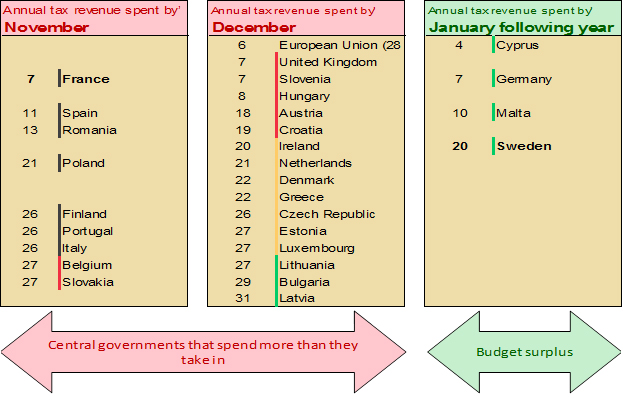On the 7th of November, the French government will have used up all of its resources and will end the year by going deeper into debt – France now accounts for the greatest imbalance in the EU
Media release
Paris, November 6, 2017 – Using data from Eurostat, the Institut économique Molinari has calculated the dates when each state in the European Union has spent all of its annual revenue.
The third edition of this study shows that:
– EU central governments use up their resources December 6 on average, 25 days before the end of the year. This is almost seven days later than the year before, representing a significant improvement.
– Despite this improvement, central governments remain the dark spot in European public finances. Across the EU, central governments account for most of the slippage in public accounts, with 25 unfunded days.
– The French central government spent the last of its resources on November 7, or 55 days before the end of the year.
– It now accounts for the greatest imbalance in the EU, ahead of Spain (50 days) and Romania (48 days).
– The gap is also growing between France and the EU average, climbing to nearly 30 days compared to 22 days the year before.
Calendar of dates when central administrations have spent all their revenue

KEY LESSONS
Central governments are the main source of public deficits in the EU
EU central governments use up their resources December 6 on average, 25 days before the end of the year. This is almost seven days later than the year before, representing a significant improvement.
Among the EU’s 28 central governments, four were in surplus last year, including Sweden, with a surplus equal to 20 days’ spending, and Germany, with a seven-day surplus. Their revenues for the year enabled them to finance all of the year’s expenditures and to lower their debt.
The 24 other central governments spent the last of their revenues before year’s end. Fifteen of them had consumed their resources by December and nine of them by November.
Despite this improvement, central governments remain the dark spot in European public finances. Across the EU, central governments account for most of the slippage in public accounts, with 25 unfunded days. Local governments have been balanced since 2014 (with four days’ surplus in 2016). This is also true of social security administrations since 2016 (one day’s surplus). As a result, taking all administrations together, the various EU countries had consumed the last of their public revenues 13 days before the end of the year. This is five days later than the year before.
The French central government’s position continues to erode, unlike the rest of the EU
The French central government spent the last of its resources on November 7, or 55 days before the end of the year.
It now accounts for the greatest imbalance in the EU, ahead of Spain (50 days) and Romania (48 days). The gap is also growing between France and the EU average, climbing to nearly 30 days compared to 22 days the year before.
This weak performance is due to France’s inability to balance its accounts sustainably since the latest crisis. While EU central governments have used the last seven years to reduce their deficits, this is not what we see in France. The post-crisis balancing of accounts stopped prematurely, four years ago. The French central government’s deficit has gone higher again since 2014, at a pace of one more unfunded day per year, while the EU lowered its deficits by five days per year on average.
These disappointing results are causing France’s position to erode yet again. The most recent balanced budget produced by the government and the various bodies in the central government dates back to 1980. Since then, every budget has been in deficit, and the day when the last of the resources were consumed has climbed a day-and-a-half per year on average.
The central government is not alone in France in failing to balance its accounts. This is also true of the social security administrations. They remain in the red, despite an array of reforms aimed at controlling the rise in health care expenditures and at tightening pension plan operations.
The study in French and in English are available on our website.
* * *
MISSION OF THE IEM
The Institut économique Molinari (IEM) is a research and educational organization with the mission of promoting individual freedom and responsibility. The institute aims to facilitate change by stimulating debate on the conventional wisdom that extends the status quo. It seeks to stimulate the emergence of new consensuses by offering an economic analysis of public policy, showing the interest of exchanges and of more moderate regulation and taxation. The IEM is a non-profit organisation financed by voluntary contributions from its members: individuals, companies or foundations. Affirming its intellectual independence, it does not accept any public subsidy.
Information and interview requests :
Cécile Philippe – director, Institut économique Molinari
(Paris, Brussels, in French or English)
cecile@institutmolinari.org
+33 6 78 86 98 58




